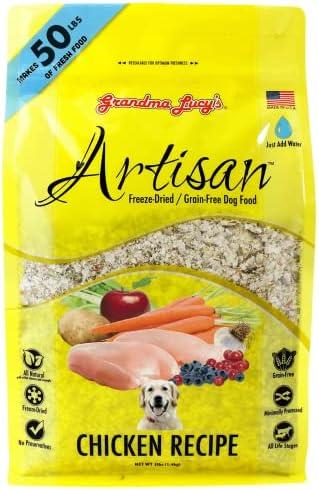In a bustling town, a family sought the perfect companion. They met Max, a golden retriever with a heart of gold. He played fetch with the kids, snuggled with Grandma, and even accompanied Dad on morning runs. Max was not just a pet; he was a loyal friend, a protector, and a source of endless joy. His adaptability and loving nature made him the best all-around dog. If you’re searching for a furry friend who fits seamlessly into every aspect of life, consider the golden retriever—your family’s new best friend awaits!
Contents
- Understanding the Characteristics of an Ideal All-Round Dog
- Evaluating Temperament and Trainability for Family Compatibility
- Assessing Health and Lifespan for Long-Term Commitment
- Exploring Popular Breeds That Excel in Versatility and Adaptability
- Q&A
Understanding the Characteristics of an Ideal All-Round Dog
When considering the traits that define a versatile canine companion, several characteristics stand out as essential. An ideal all-round dog should possess a **balanced temperament**, exhibiting both playfulness and calmness. This balance allows them to adapt to various environments, whether it’s a bustling family home or a serene countryside retreat. Their ability to switch between energetic playtime and quiet companionship makes them suitable for families, singles, and seniors alike.
Another crucial attribute is **intelligence**. A dog that can learn commands quickly and solve problems is not only easier to train but also more engaging for its owner. This intelligence fosters a strong bond between the dog and its human, as they can participate in a variety of activities together, from obedience training to agility courses. Moreover, an intelligent dog can provide companionship that evolves with the owner’s lifestyle, making them a lifelong friend.
Moreover, **sociability** is a key characteristic of an all-round dog. These dogs should be friendly and adaptable, getting along well with children, other pets, and strangers. Their sociable nature ensures that they can thrive in different social settings, whether it’s a family gathering, a trip to the dog park, or a visit to a friend’s house. A dog that enjoys the company of others is not only a joy to have around but also enhances the social experiences of their owners.
Lastly, **health and adaptability** cannot be overlooked. An ideal all-round dog should have a robust constitution, allowing them to participate in various activities without frequent health issues. Additionally, they should be adaptable to different living conditions, whether that means thriving in an apartment or a house with a yard. This versatility ensures that they can fit seamlessly into their owner’s lifestyle, providing companionship and joy in any setting.
Evaluating Temperament and Trainability for Family Compatibility
When considering a dog for your family, evaluating temperament is crucial. A well-balanced dog should exhibit a friendly and calm demeanor, making them suitable for various family dynamics. Look for breeds known for their sociable nature, such as the **Labrador Retriever**, **Golden Retriever**, or **Beagle**. These breeds tend to be affectionate and gentle, which is essential for families with children or other pets. A dog that is patient and tolerant can create a harmonious environment, reducing the likelihood of stress or conflict within the household.
Trainability is another key factor in determining a dog’s compatibility with family life. A dog that is eager to learn and responds well to commands can significantly enhance the family experience. Breeds like the **Poodle**, **German Shepherd**, and **Border Collie** are renowned for their intelligence and willingness to please. These dogs thrive on mental stimulation and can easily adapt to various training methods, making them ideal companions for families who enjoy engaging in activities together.
Moreover, it’s essential to consider the energy levels of different breeds. A dog that matches your family’s lifestyle will lead to a more fulfilling relationship. For active families, breeds such as the **Australian Shepherd** or **Vizsla** may be perfect, as they require regular exercise and enjoy participating in outdoor activities. Conversely, if your family prefers a more laid-back lifestyle, consider breeds like the **Basset Hound** or **Shih Tzu**, which are generally more relaxed and require less physical activity.
assessing a dog’s adaptability to various environments is vital. A dog that can comfortably transition from a bustling household to quiet moments will be more compatible with family life. Look for breeds that are known for their versatility, such as the **Cavalier King Charles Spaniel** or **Boxer**. These dogs often exhibit a balanced temperament, allowing them to thrive in diverse situations, whether it’s a lively family gathering or a peaceful evening at home.
Assessing Health and Lifespan for Long-Term Commitment
When considering a dog for long-term companionship, evaluating health and lifespan is crucial. Different breeds come with varying predispositions to health issues, which can significantly impact their quality of life and longevity. For instance, larger breeds like Great Danes and Saint Bernards often face shorter lifespans, typically ranging from 7 to 10 years, while smaller breeds like Chihuahuas and Dachshunds can live well into their late teens. Understanding these differences can help potential dog owners make informed decisions that align with their commitment level.
In addition to breed-specific health concerns, it’s essential to consider the overall health of the dog. Regular veterinary check-ups, vaccinations, and preventive care play a vital role in extending a dog’s life. Moreover, responsible breeding practices can mitigate many hereditary health issues. When selecting a dog, look for reputable breeders who prioritize health testing and transparency about their dogs’ medical histories. This diligence can lead to a healthier companion and a more fulfilling relationship.
Another factor to consider is the dog’s lifestyle needs, which can influence both health and lifespan. Active breeds, such as Border Collies and Labrador Retrievers, require regular exercise and mental stimulation to thrive. Conversely, more sedentary breeds may be better suited for individuals or families with a less active lifestyle. Understanding the energy levels and exercise requirements of different breeds will ensure that you can meet their needs, promoting a healthier and longer life.
nutrition plays a pivotal role in a dog’s health and longevity. A balanced diet tailored to the specific needs of the breed, age, and health status can prevent obesity and related health issues. Investing in high-quality dog food and being mindful of portion sizes can significantly enhance your dog’s overall well-being. By prioritizing these aspects, you can foster a long-lasting bond with your canine companion, ensuring they lead a happy and healthy life by your side.
Exploring Popular Breeds That Excel in Versatility and Adaptability
When considering a dog that can seamlessly fit into various lifestyles, certain breeds stand out for their remarkable versatility and adaptability. These dogs not only thrive in diverse environments but also excel in various roles, from family companions to working partners. Their ability to adjust to different situations makes them ideal for individuals and families alike, ensuring that they can meet the demands of modern life.
One breed that exemplifies these qualities is the **Labrador Retriever**. Known for their friendly demeanor and intelligence, Labs are incredibly versatile. They excel in roles such as therapy dogs, service animals, and even in search and rescue operations. Their eagerness to please and trainability make them a favorite among families, as they adapt well to both active and relaxed lifestyles. Whether you’re hiking in the mountains or lounging at home, a Labrador is sure to fit right in.
Another breed worth mentioning is the **Golden Retriever**. Renowned for their gentle temperament and high intelligence, Golden Retrievers are not only excellent family pets but also thrive in various working roles. Their adaptability allows them to excel in obedience, agility, and even as assistance dogs for individuals with disabilities. With their friendly nature and love for human companionship, they are perfect for families with children and can easily adjust to different living situations, from apartments to spacious homes.
Lastly, the **Australian Shepherd** deserves recognition for its versatility. This breed is known for its high energy levels and intelligence, making them ideal for active families or individuals who enjoy outdoor activities. Australian Shepherds are quick learners and can adapt to various tasks, from herding livestock to participating in dog sports. Their loyalty and protective instincts also make them excellent family guardians, ensuring that they not only fit into your lifestyle but also enhance it with their dynamic presence.
Q&A
-
What breeds are considered the best all-round dogs?
Some of the top breeds recognized as the best all-round dogs include:
- Labrador Retriever - Known for their friendly nature and versatility.
- Golden Retriever – Renowned for their intelligence and loyalty.
- Beagle – Great family pets with a playful disposition.
- German Shepherd - Highly trainable and protective, making them excellent companions.
-
What qualities should I look for in an all-round dog?
When selecting an all-round dog, consider the following qualities:
- Temperament – Look for a friendly and adaptable personality.
- Trainability – Choose a breed that is eager to learn and respond well to commands.
- Energy Level – Ensure the dog’s energy matches your lifestyle, whether active or more relaxed.
- Health – Opt for breeds known for their overall health and longevity.
-
Are all-round dogs suitable for families?
Absolutely! All-round dogs are often ideal for families due to their:
- Gentle Nature – Many breeds are patient and good with children.
- Social Skills – They tend to get along well with other pets and people.
- Adaptability – They can adjust to various living situations, from apartments to larger homes.
-
How do I choose the right all-round dog for my lifestyle?
To find the perfect all-round dog for your lifestyle, consider:
- Activity Level – Match the dog’s energy with your daily routine.
- Space – Ensure you have enough room for the breed’s size and exercise needs.
- Time Commitment – Be realistic about the time you can dedicate to training and socialization.
- Allergies - If allergies are a concern, look for hypoallergenic breeds.
the best all-round dog combines adaptability, temperament, and health. Whether you seek a loyal companion or a family pet, investing time in research will ensure you find the perfect match for your lifestyle. Choose wisely for a lifetime of joy!

大家好,我是彼得潘,專業的手法身體治療師。我喜歡探索和研究各種主題,並透過與人工智慧的合作分享專業、實用、有趣的文章。我們定期進行人工審核,以確保內容的準確性。如果您發現文章中有任何不準確的地方,請隨時與我們聯繫,我們會及時糾正。您可以透過 [email protected] 與我們聯繫。



